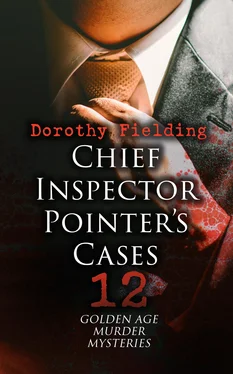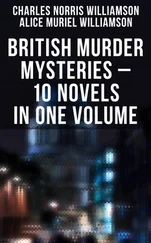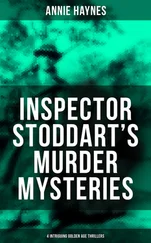"Stop! Write all this down." She sprang to her feet and leant heavily against the table, rocking as she stood. "Write it all out, and I'll sign it, and then we'll see if those blood-suckers get off with only a couple of months. Months! While I..."
"You'd better see a solicitor," suggested the Chief Inspector half-heartedly, but remembering the jury's passion for every advantage to be given to the criminal, as he pulled out the sheets, which were burning his fingers.
"No, no! Is that it? Let me read it over."
"If you want to sign it, just add a line at the foot to say that you have read it through and that it is correct."
"I'll put more than that in. I want to say that these three blackmailers instigated Robert Erskine's death. They told me what to do. Ever since yon Baker found me one day asleep with my wig awry she's lived on me, she and Vaughan, who was her lover at the time, and the man she calls her husband now."
"And Miss West, what were you going to do to her?" Carter spoke for the first time—he had been literally spellbound till then. "What of her?"
For a second the woman blinked at him as though hardly remembering to whom he referred.
"I'm writing that down, too. When I told them that she had discovered something wrong with the letters—letters they drafted for me, mind you they insisted on drugging her, and—and—they told me that she was to be put ashore somewhere. I thought she was to be kept till we could get away safely." Her eyes flickered uneasily, and fell to the paper.
In a fury of vengeance which burned away all thought of personal safety for the moment if only she could engulf the others deep enough, Janet Fraser wrote nearly two pages before she signed her name, with Carter and Watts as witnesses.
The Chief Inspector drew a deep breath of relief, and motioned Carter to precede him out of the room.
Janet Fraser's hand went to a little picture standing on the mantelpiece, a sketch of her father's manse. The frame was a Florentine one, and in a corner her finger pared off a tiny gilt pellet as she apparently automatically adjusted the water-color. When Pointer turned to speak to Watts she slipped it into her mouth. It was a way of escape she had prepared long ago.
"I shall be quite ready to come with you to England without waiting for an extradition order," she said quietly as she lay down on the couch again and pulled the rug up over her, "but I'm exhausted for the moment. I want a little rest."
"Very good. I'll arrange about our tickets so that we can get off by the early train if possible. I'll be back within an hour and let you know what has been settled. There will be Watts on duty outside, but I think you'll be sensible."
"Quite sensible," murmured Janet Fraser, looking him full in the face for a second, and then dropping those pale grey eyes of hers.
Carter and the Chief Inspector walked away in silence. At last the Canadian spoke.
"So it wasn't Beale after all, and Rob was murdered by that she-devil who passed as his mother because he would have given the show away! I'm glad you got her! God! I never thought I should like to see a woman arrested for murder, but I'm glad you got her! And, see here, Inspector, I do see why you weren't keen on my helping, nor Christine either: it did take a mighty keen eye—a trained one—to pick out the king-log from that jumble."
"Largely a matter of routine," muttered Pointer, lighting his pipe.
"Routine!" Carter echoed. "I suppose it was routine that lets Christine sleep safely in her bed tonight. Poor old Rob. To be done in like that...I wish to Heaven..." He was silent for a few minutes. "But how in tarnation did you get hold of—of—the truth?"
"Well, it's a longish story. First of all, as I said, was that letter this woman wrote to Erskine which we found among the papers Beale had got hold of—she had destroyed the others, you know—asking him to let her know his address in London at once. That only bewildered me. You don't suspect a mother easily of having a hand in her son's murder, but I began to wonder whether Robert Erskine might turn out not to be her son at all. I found that that was impossible, and I began speculating a bit along the lines of the truth. A Toronto stationery box I found in her attic here made me doubt whether the letters I had taken a bit for granted, I confess, were as genuine as they looked. I had noted the water-mark, but had let them go at that, under the circumstances—my mistake that! Then—well, what with one thing and another, I got hold of a key to her safe and that unlocked her story as well, or at least the clue to it. It was this way. In the safe were a couple of the real Mrs. Erskine's old diaries, a large photo of herself, a small razor, and a couple of white wigs. Strange things for a lady to keep with her jewels, eh? The photo set me thinking. It had been constantly handled, and had a clip fastened to the top to allow of its being hung on any convenient nail. But why? Taken in conjunction with the wigs, why else than to make up like it? Then the little razor—Mrs. Erskine's queer eyebrow would fit that idea. In Janet Fraser's photo—I only got it later on, of course; didn't know of her existence then—you'll see what beetling eyebrows she has by nature. The two women were otherwise about the same size and general build. With the wig, and the eyebrow shaved to a peak in the middle, and after years of semi-invalidism, the one could easily pass herself off for the other, when there were no suspicions alert. I found in my hunt at the villa an old pill-box which gave me a Biarritz address, and went there. The rest of the story...? Well, after that it was—"
"Merely a matter of routine," suggested Carter; "but say, Chief Inspector, I'll never forget what I owe you. You saved me once when you drew Beale's fangs, and you've saved Christine tonight."
"I don't mind telling you that I never in all my life spent a worse five minutes than when I had to decide what had become of her, and knew that if I made a mistake there would be no time to put it right." Pointer spoke with feeling.
"What made you guess the river?" Carter asked in a hushed voice.
"Couldn't see what else they could do with her. It was obvious that the house had been cleared so that no one should know of her second arrival. When she had been at the villa before, she had practically no friends on this side of the Atlantic. I think they counted on that a bit. I know this coast pretty well. As Mr. Deane, I've walked it over for hours, and I couldn't call to mind any ravine or place where a body could be dropped as though from a motor accident except some spots a good way off, and where a very stiff gradient had to be climbed. The tires and the small amount of petrol were against them. There only remained the sea, for the villa itself was out of the question. What they wanted was an accident, not a body that could be found some time or other, and prove it to've been a murder."
"You jumped to the conclusion at once that her life was in danger, then?"
Pointer put his head on one side. "Well...in a murder case there generally comes a moment when a second murder seems the only way to keep the first one quiet."
The two men stopped at the Negresco, and Pointer glanced up at the purple roofs high above them.
"Don't let yourself feel too grateful, Mr. Carter. You and Miss Leslie, as was, quite tangled me up for a while. There were weeks when I felt none too sure of either of you."
"See here," Carter stopped him as he would have turned away, "I saw that man of yours—Watts—pull out a knife tonight to sharpen a pencil. My knife! I had lent it to a funny old geezer here, a Colonel Winter, who's pestered me the last fortnight, buzzing around me, and I've been kind of figuring—"
But the Chief Inspector was gone. Carter gazed after him. "Well, I guess our British police take some beating after all." And he went upstairs to write out a wire offering a reward of five thousand pounds to anyone who should first find the murderer of Robert Erskine. The wire was sent off to the Yard, after a futile effort on his part to get it dated earlier in the day. He thought it would look more natural to Pointer, but he consoled himself afterwards with the knowledge that it would have made no difference in the Chief Inspector's acceptance of the sum solely on behalf of the Police Widows' and Orphans' Fund.
Читать дальше












